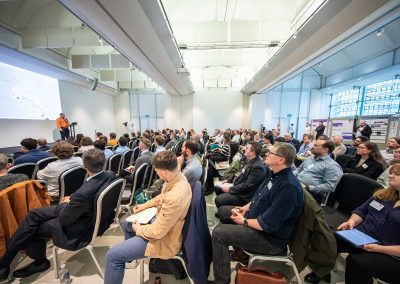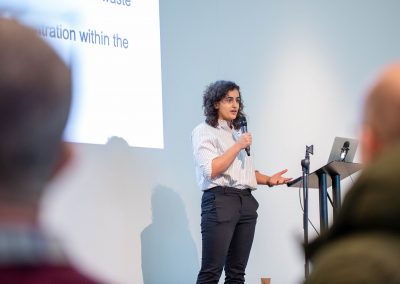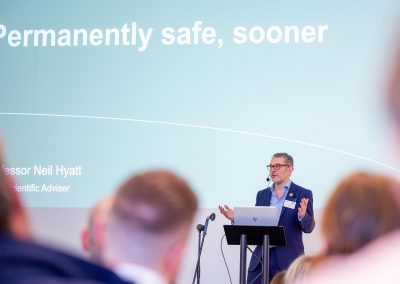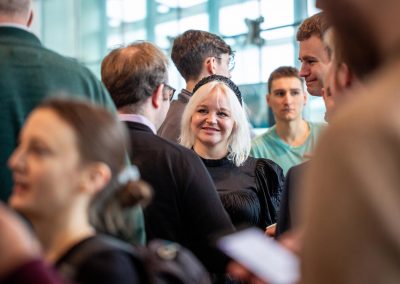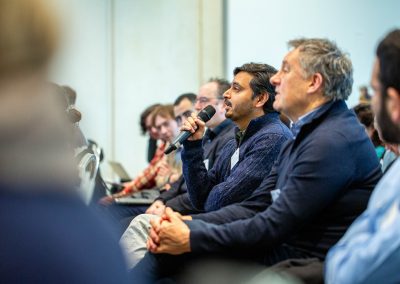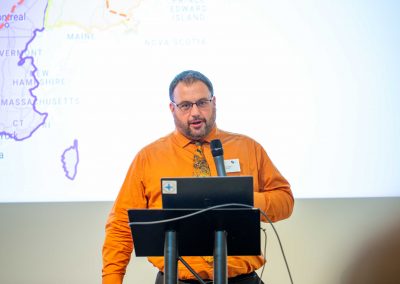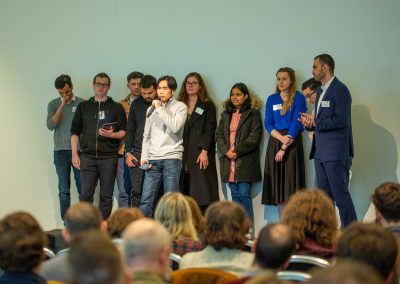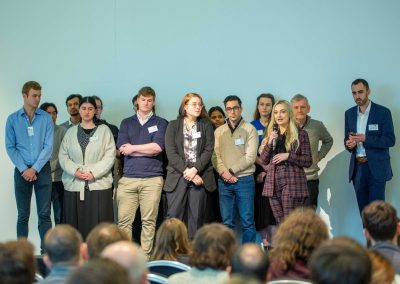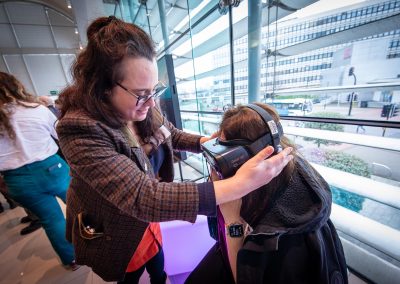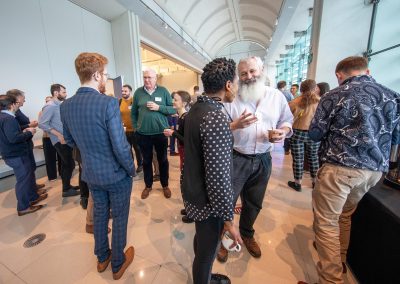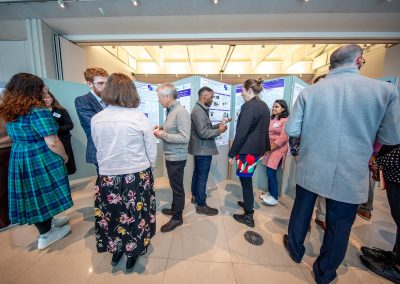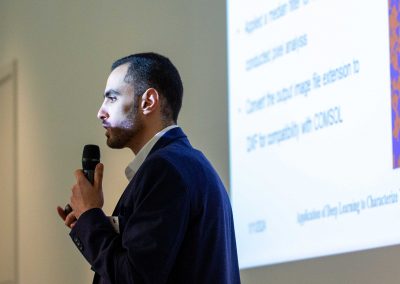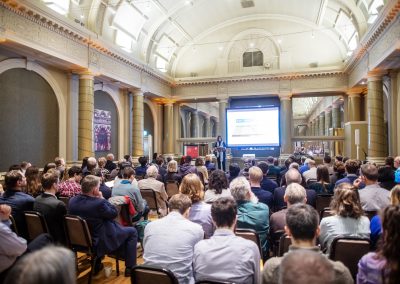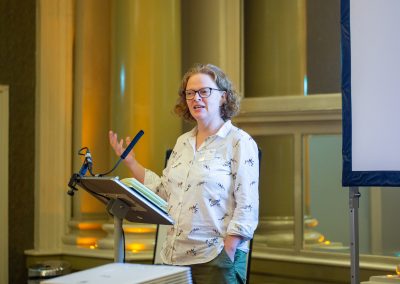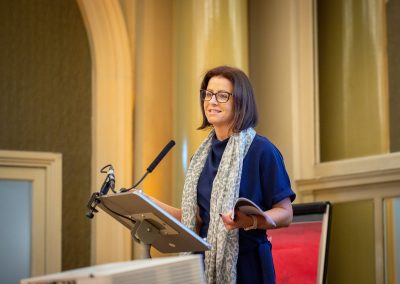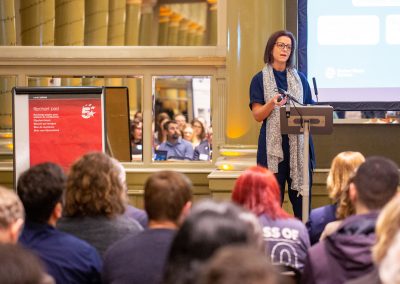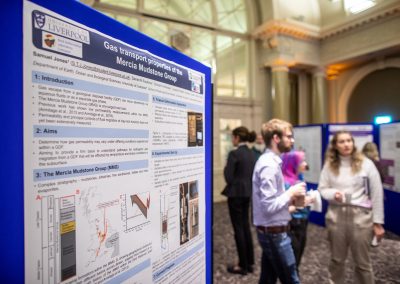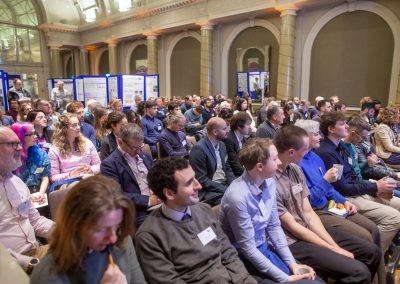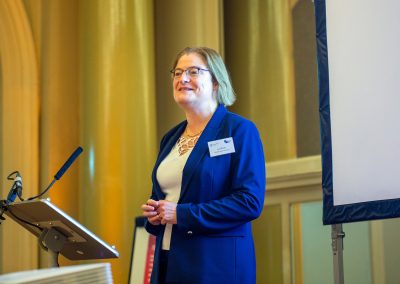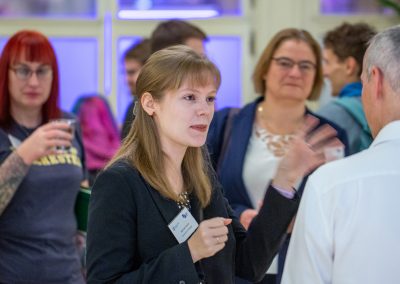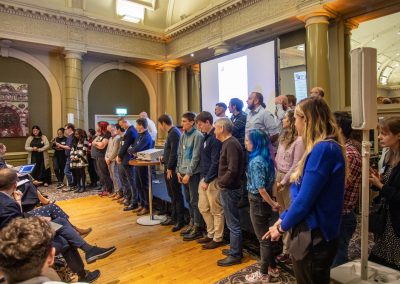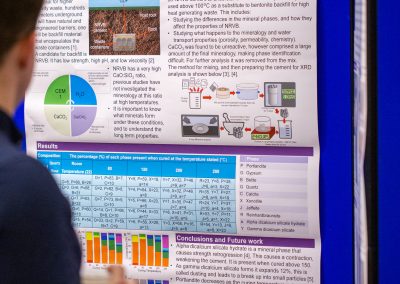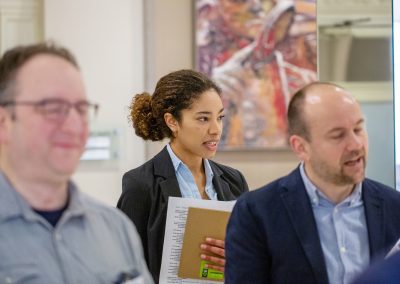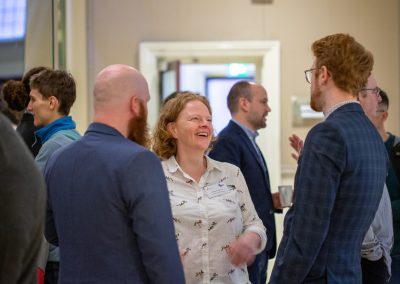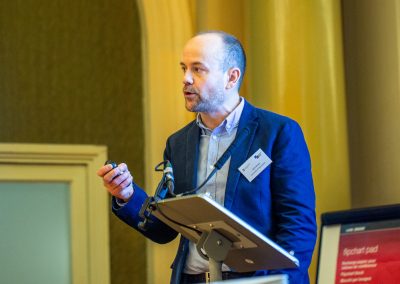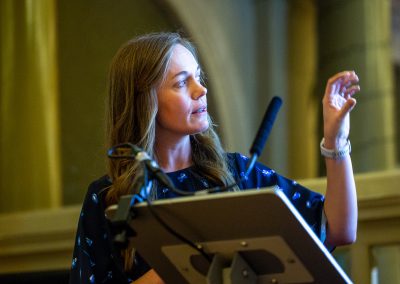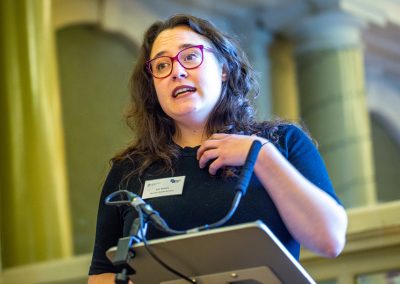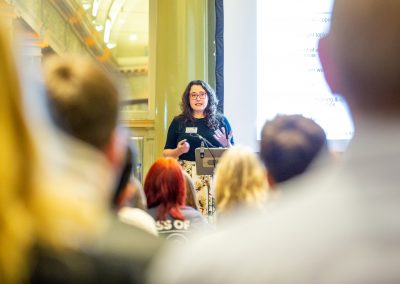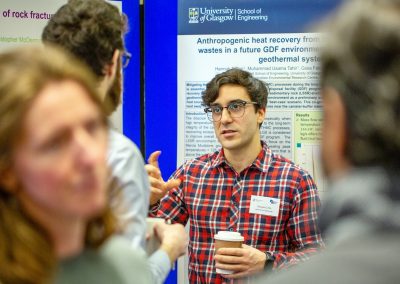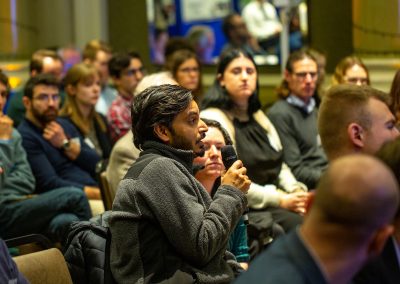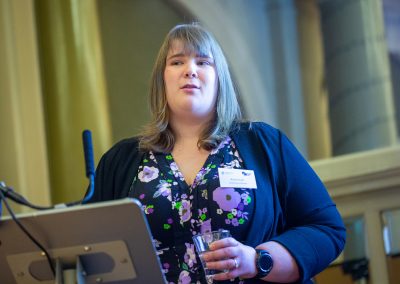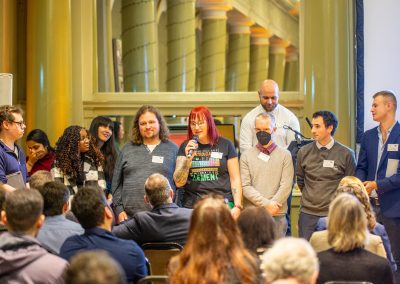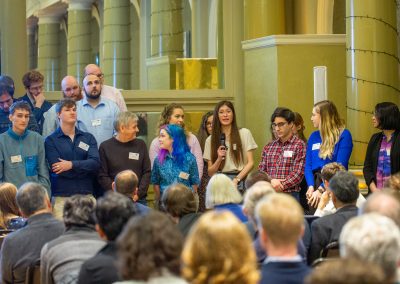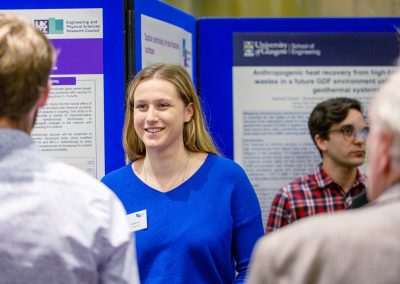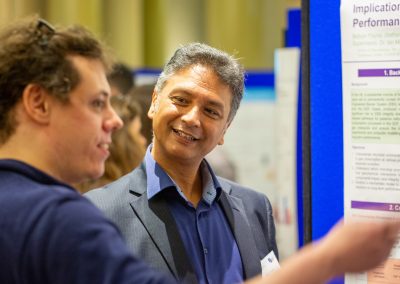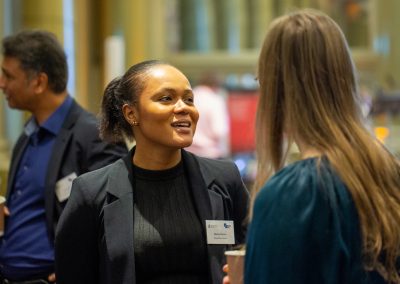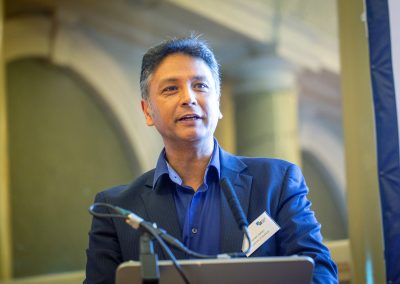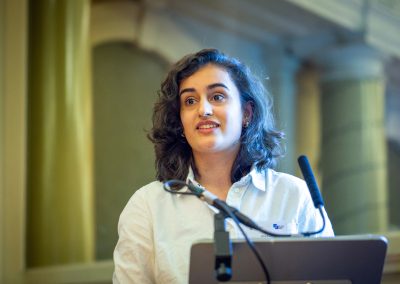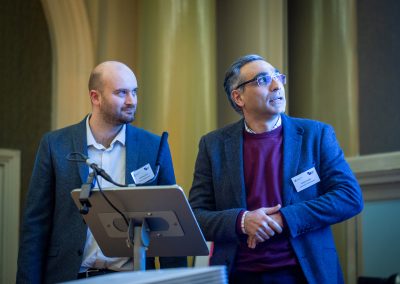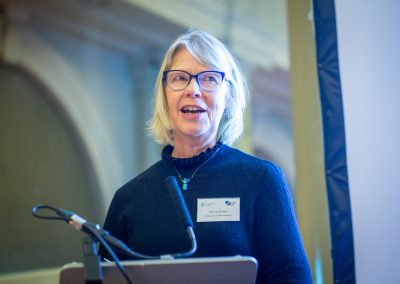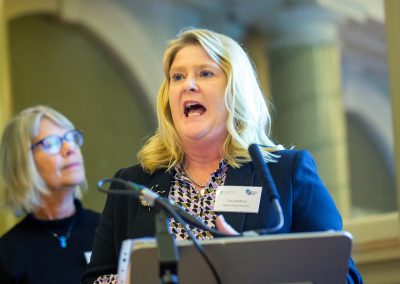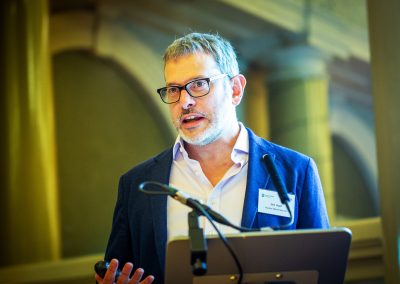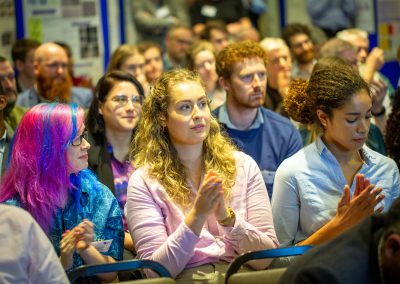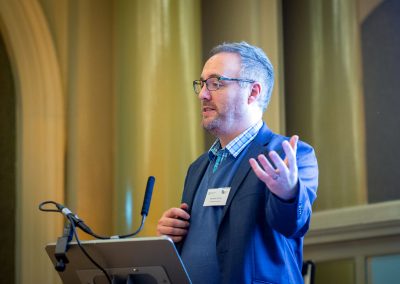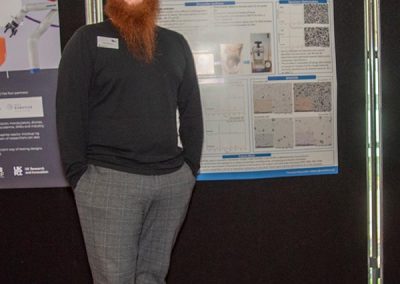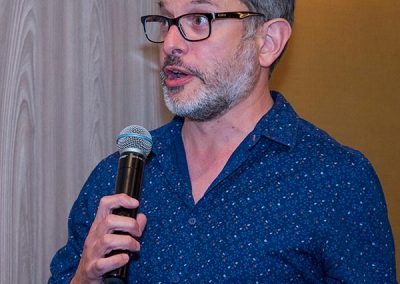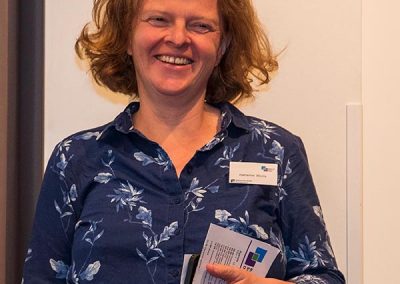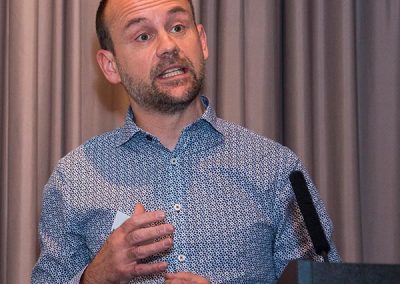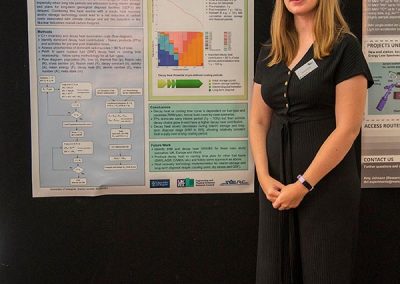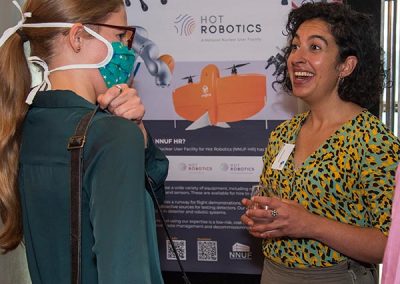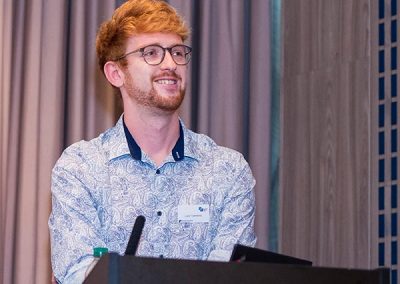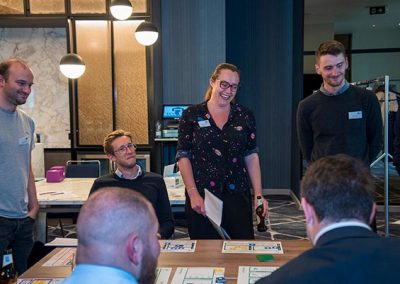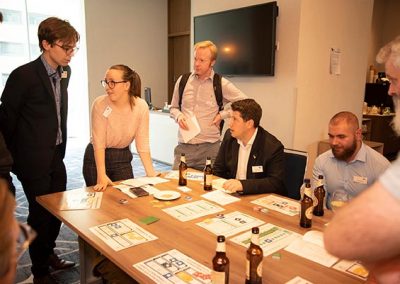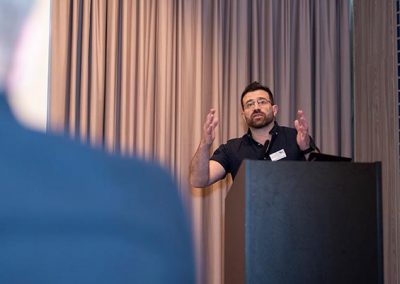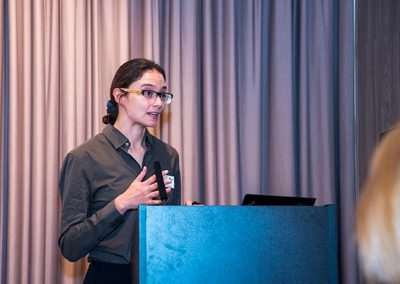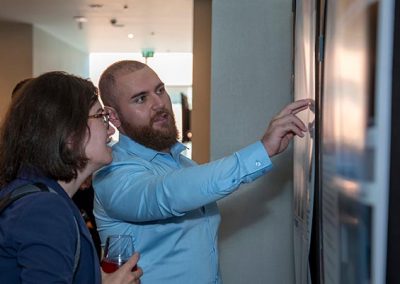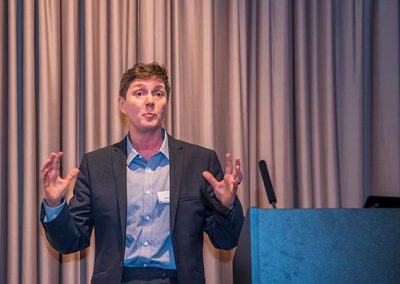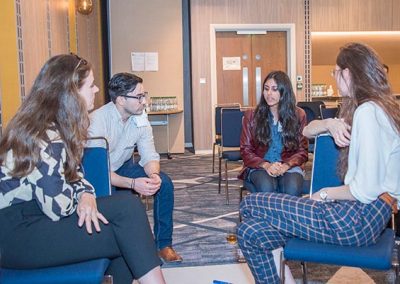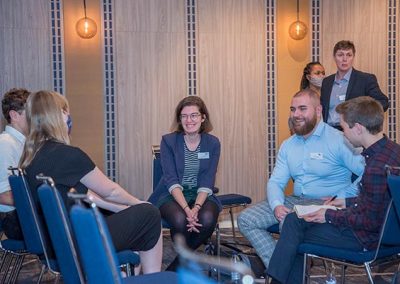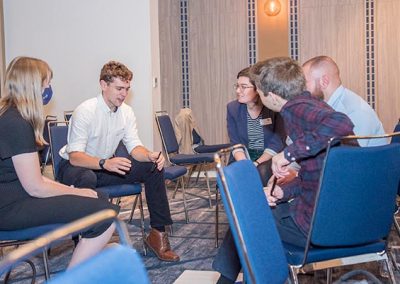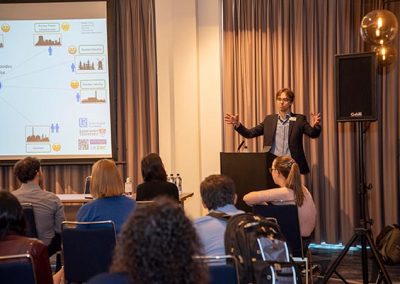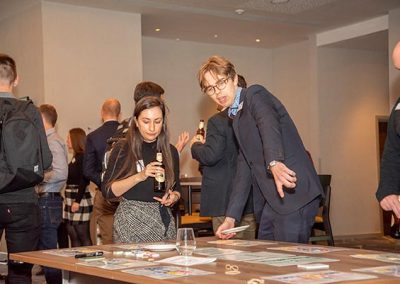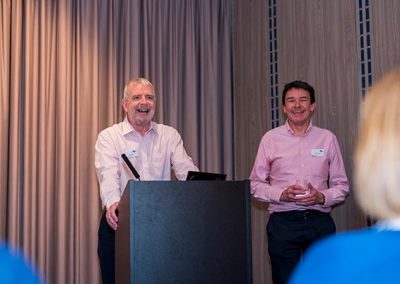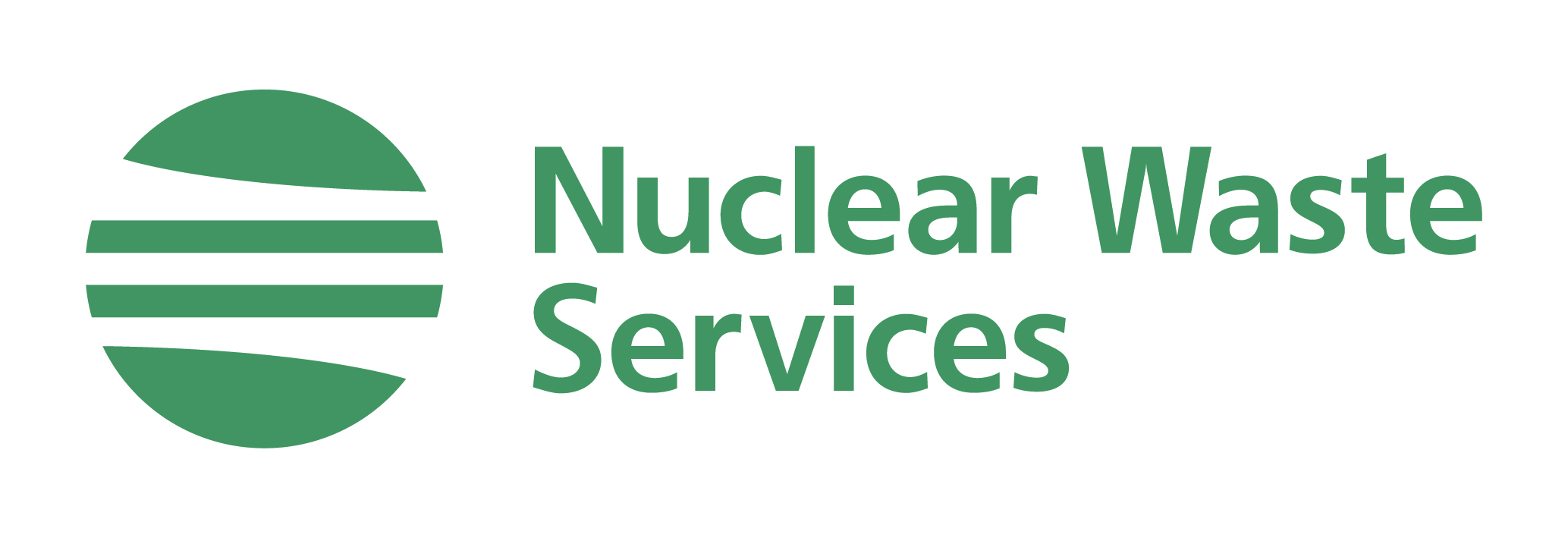Previous events
Details of our previous events are shown below.
NWS RSO Annual Conference
11 – 12 January 2024
In January 2024 we held our third annual conference for the Nuclear Waste Services Research Support Office (NWS RSO) in Sheffield.
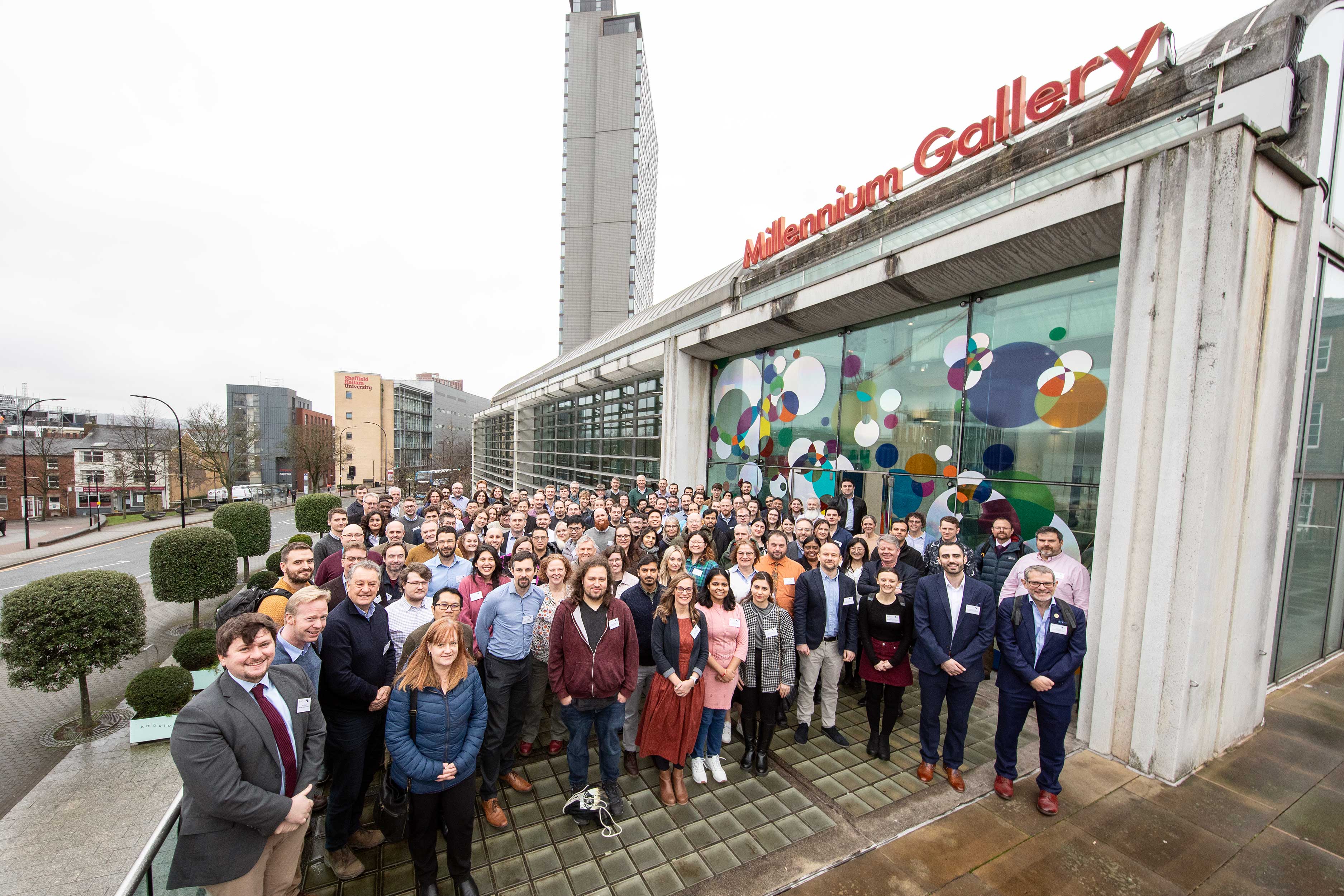
Event summary - 2024
The third NWS Research Support Office Annual Conference was held in Sheffield 11-12 January 2023. Over 150 people across academia, industry, funders and regulators joined us at the Millennium Gallery for a successful 2-day event.
We welcomed delegates from UK universities across the country along with NWS staff, the Environment agency and industry. The attendance at this event exceeded our previous conference and was a great opportunity for attendees to discuss their research and discover related research being carried out by our researchers.
The opening day started with a keynote speech from Neil Hyatt, Chief Scientific Advisor at Nuclear Waste Services and also feature a fascinating speech by Peter Keech from Canada’s Nuclear Waste Management Organization sharing a brief insight into their research and development towards a GDF.
A feedback survey will shortly be shared to gather views from the attendees on both the conference and the RSO. This feedback will be taken on board to improve future events and how we work.
Programme Agenda and Slides
We will add links to the slides below once they are available.
Day 1 – 11 January
09:00 Registration and coffee
09:30 Housekeeping: Paddy Hackett (RSO Project Manager)
Welcome: Katherine Morris (RSO Director) and Kat Raines (NWS Senior
Research Manager – RSO)
09:40 NWS Keynote presentation Neil Hyatt (Chief Scientific Advisor, NWS)
10:10 Highlights from the RSO and upcoming opportunities: Sam Shaw (RSO Manchester lead), Claire Corkhill (RSO Bristol lead) and Kat Raines (NWS Senior Research Manager – RSO)
10:25 Social Science discipline update: Penny Harvey (Discipline Lead) and Mike Brophy (NWS SME)
10:30 Intergenerational democracy, justice, and nuclear waste: Lee Towers (Teesside University)
10:45 Environmental Science discipline update: David Copplestone (Discipline Lead) and Jess Burrows (NWS SME)
10:50 Coastal processes in the selection of a GDF: Alfie Hewetson (Imperial)
11:05 Break
11:30 Advanced Manufacturing discipline update: Steve Jones (Discipline lead) and Richard Hardy (NWS SME)
11:35 Mixing Behavior of Laminar Plumes with and without a Ventilating Crossflow: Arij Asad (University of Bristol)
11:50 Applied Mathematics discipline update: Robert Zimmerman (Discipline lead) and Oliver Hall (NWS SME)
11:55 Application of Deep Learning to Characterise Transport of Waste-Derived Gas in LSSRs: Abdelrazik Elfar (The University of Manchester)
12:10 Poster Introductions
12:50 Lunch
13:50 Poster session
14:50 R&D Programs within Canada’s Nuclear Waste Management Organization: Peter Keech, Nuclear Waste Management Organization, Canada
15:30 Break
15:50 Equality, Diversity and Inclusion Panel: Kat Raines (NWS RSO Senior Research Manager) and Becky Lunn
(University of Strathclyde)
16:20 Subsurface Engineering discipline update: Becky Lunn, (Discipline lead) and Elaine Holme (NWS SME)
16:25 Self-sealing in Lower Strength Sedimentary Rocks: Some preliminary results: Thomas Berry (Leeds University)
16:40 Day 1 close
Day 2 – 12 January
09:00 Welcome: Katherine Morris (RSO Director) and Kat Raines (NWS Senior Research Manager – RSO)
09:05 Engineered Barrier Systems discipline update: Majid Sedhigi (Discipline lead) and Matthew Kirby (NWS SME)
09:10 Quick Clay: An alternative material for engineered barriers: Matteo Pedrotti (Leeds University)
09:25 NWS Keynote Presentation – Siting: Fiona McEvoy (NWS, Head of Geosphere Characterisation)
09:45 Siting Panel Discussion: Panel members: Adrian Bull (Chair, UoM), Fiona McEvoy (NWS), Bruce Cairns (NWS), Neil Hyatt (NWS), Penny Harvey (UoM), Claire Corkhill (UoB)
10:30 Break
11:00 Geoscience discipline update: Kevin Taylor (Discipline lead), Andy Cooke and Alex Hughes (NWS SMEs)
11:05 GeoSafe: Robert Zimmerman (PI), Sam Shaw, Dan Faulkner and Adriana Paluszny Rodriguez (Work Package Leads)
11:35 Permeability of the Mercia Mudstone Group: implications to GDF gas migration: Sam Jones (University of Liverpool)
11:50 Radiochemistry discipline update: Antonia Yorkshire (NWS SME)
11:50 The Missing Sink? Controls on Iodine Migration in the Geosphere: Meg Watters (The University of Manchester)
12:10 Skills and Communication update: Adrian Bull (Discipline lead)
12:15 The Effect of Alkali Metal Cations on the Dissolution Behaviour of UK High Level Waste Glass: Jenny Ayling (University of Sheffield)
12:30 Lunch and poster voting
13:45 Early Career Researcher Panel: Chair: Kat Raines, Panel members: Tom Neill, Lewis Blackburn, Clare Thorpe, Luke Townsend, Lee Towers
14:30 Materials discipline update: Ian Farnan (Discipline lead) and NWS SME
14:35 Analysis of William Aspdin’s 1848 hardened cement paste: compositional and microstructural analysis: Adwoa Owusu (University of Leeds)
14:50 Poster winners
14:55 Summary and feedback
15:10 Closing remarks
15:15 Coffee and close
15:15 – 16:45 Tours of University of Sheffield labs and facilities (optional)
NWS RSO Conference 2024 Gallery
PHREEQC and Nuclear Environmental Research Training Course
3 – 4 April 2023
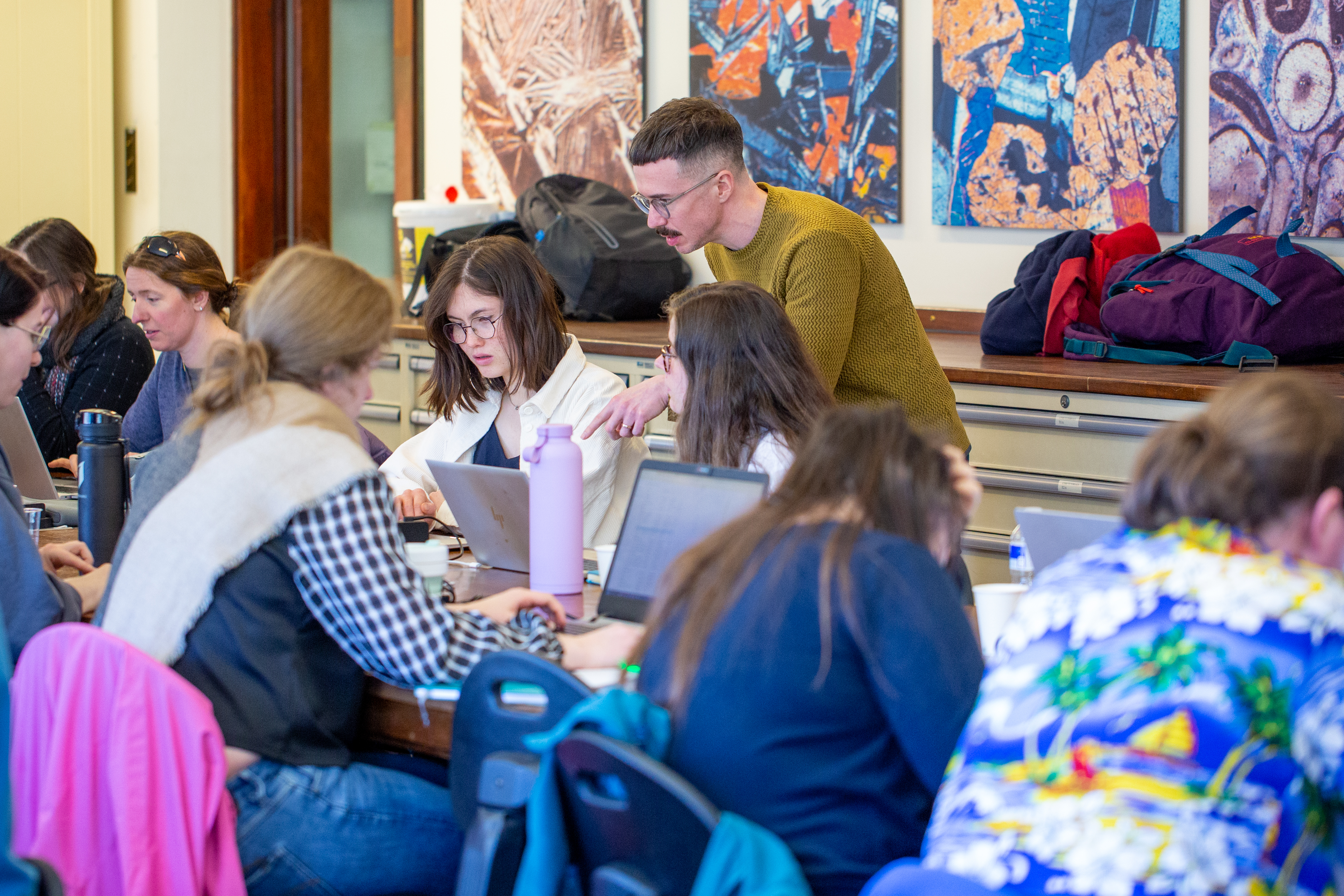
On 3rd & 4th April 2023 the National Nuclear Laboratory, in collaboration with the Nuclear Waste Services Research Support Office hosted a 2-day workshop at The University of Manchester to train researchers from the UK nuclear environmental academic community on the geochemical modelling code PHREEQC. This modelling software is widely used around the world for simulating chemical reactions and transport processes in water, lab experiments and in the industrial arena including in radioactive waste disposal.
NNL’s Liam Abrahamsen-Mills, Aislinn Boylan, Mike Kallo and Sophie Cooper, and NWS colleague Niko Kampman introduced PHREEQC and its application in nuclear environmental research to over 30 researchers from 8 industry and academic organisations and from a wide variety of subject areas who are interested in using PHREEQC for their research.
Liam Abrahamsen-Mills, Fellow in Environmental Radiochemistry, NNL
The workshop included a series of case studies, drawing on NNL’s experience, and hands-on activities such as simulating the kinetics of microbial metabolism and the growth of biomass, and exploring the benefits of linking PHREEQC with the statistical language R for running many simulations in parallel.
The workshop was co-organised with the support of the NWS Research Support Office and was well received by RSO researchers and NWS staff, who will be able to utilize PHREEQC in their research.
Rebecca Lindsey-Halls, RSO PhD Student, University of Strathclyde
To find out more about NNL visit their website here: https://www.nnl.co.uk/
If you want to be notified about any future RSO training events please sign up for our newsletter here.
NERC Highlight Topic Workshop
20th March 2023, online
This was a workshop to support a submission for a NERC highlight topic. Working with NWS, and other stakeholders from across the nuclear industry, the RSO has been developing a proposal titled “From land to sea: characterising and understanding risks from radioactive contaminant sinks in an evolving marine environment”. This highlight topic proposal will be submitted to NERC in May and, if successful, would lead to a funding call opening the following year. From nuclear new build to the development of in-shore geological disposal concepts, there is an increase in activity from nuclear sites in the coastal and marine region. This highlight topic workshop was a useful way of seeking feedback from the academic community to ensure the proposal includes the novel underpinning research that is required.
The workshop was held online and included short scene-setting presentations from the RSO followed by group discussion. Feedback and input from the delegates will be collated and inform the highlight topic application.
NWS RSO Annual Conference
12 – 13 January 2023
In January 2023 we held our second in person annual conference for the Nuclear Waste Services Research Support Office (NWS RSO) in Leeds.
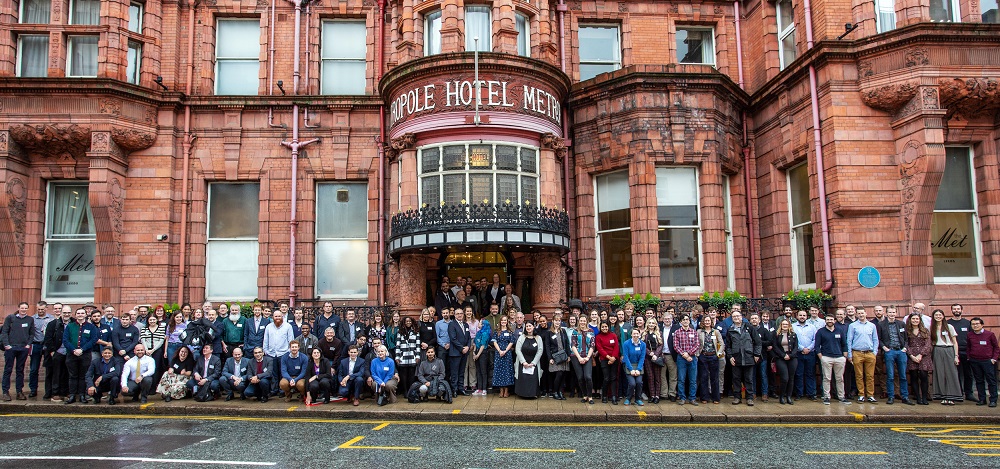
Event summary
The NWS Research Support Office Annual Conference was held in Leeds 12-13 January 2023. Over 130 people across academia, industry, funders and regulators joined us at the Leeds Met Hotel for a successful 2-day event. We welcomed delegates from a range of UK universities, NWS and industry. The attendance at this event outstretched our previous conference and was a great opportunity for attendees to meet face to face and discuss their research and catch up.
The opening day started with a keynote speech from Corhyn Parr, Nuclear Waste Services CEO.
A feedback survey has been shared after the event to gather views on both the conference and the RSO. This feedback will be taken on board to improve future events and how we work. Slides from the conference are available on the website, just scroll down to “Programme agenda and slides”
Programme Agenda and Slides
Some slides have been omitted to remove unpublished data.
Day 1 – 12 January
09:00 Registration and coffee
09:50 Housekeeping: Helen Bayram (RSO Project Manager)
10:00 Welcome: Katherine Morris (RSO Director) and Lucy Bailey (NWS, Head of the RSO)
Keynote presentation
10:05 NWS Keynote talk: Corhyn Parr (NWS, CEO)
10:35 Highlights from the RSO and upcoming opportunities: Sam Shaw (RSO Manchester lead), Claire Corkhill (RSO Sheffield lead), Kat Raines (NWS RSO Deputy)
10:50 Questions to RSO/NWS panel
11:00 Break
11:30 Materials discipline update: Ian Farnan (Discipline lead), Materials SME (NWS)
11:40 Spent MAGNOX fuel disposal: Rosie Smart (University of Bristol)
11:55 Underpinning the disposability of candidate plutonium wasteforms: Amber Mason (University of Sheffield)
12:10 Poster presentations
12:30 Lunch and poster session
14:00 Advanced Manufacturing discipline update: Steve Jones (Discipline lead), Richard Hardy (NWS SME)
14:10 Ventilation of Hydrogen in UILW vaults: Arij Asad (University of Bristol)
14:25 Social Sciences discipline update: Penny Harvey, (Discipline lead), Tracy Badham (NWS SME)
14:35 Engaging with intergenerational justice in radioactive waste management: Matthew Cotton (Teesside University)
14:50 Engineered barriers discipline update: Majid Sedighi (Discipline lead), Matt Kirby (NWS SME)
15:00 Bentonite microbial activity in systems relevant to geological disposal of radioactive wastes: Max Rose (University of Manchester)
15:15 Break
15:25 Academic research to underpin the GDF safety case: Neil Hyatt (NWS Chief Scientist), Lucy Bailey (NWS)
15:45 Tour of Leeds university facilities (limited spaces) and communication training session for RSO researchers and anyone that would like to participate
Day 2 – 13 January
09:00 Welcome: Katherine Morris (RSO Director) and Lucy Bailey (NWS, Head of the RSO)
09:05 GDF design strategy: John Corderoy (NWS GDF Technical Director))
Keynote presentation
09:45 Long-term shale barrier performance: Evidence from the petroleum industry and implications for the safety case for radioactive waste storage in the Opalinus clay: Quentin Fisher (University of Leeds)
10:30 Break
10:45 Sub-surface engineering discipline update: Becky Lunn (Discipline lead), Elaine Holme and Alan Hodge (NWS SMEs)
10:55 Environmental sciences discipline update: David Copplestone (Discipline lead), Kat Raines (NWS SME)
11:05 Effects of Coastal Change in the selection of a Geological Disposal Facility: Ioannis Karmpadakis (Imperial College London)
11:20 Break
11:45 Applied Mathematics discipline update: Robert Zimmerman (Discipline lead), Oliver Hall (NWS SME)
11:55 Radiochemistry discipline update: Francis Livens (Discipline lead), Will Bower (NWS SME)
12:05 Sulfidation of magnetite-bound 99Tc: Tom Neill (University of Manchester)
12:20 Skills and Communication update: Scott Heath and Adrian Bull (Discipline leads)
12:30 Lunch
13:30 Disposal of Radioactive Waste: the role of a geological survey: Dave McCarthy (BGS)
14:00 Geosciences discipline update: Kevin Taylor (Discipline lead), Alex Hughes and Andy Cooke (NWS SMEs)
14:10 Dissolution reactions in halite; implications for GDF safety: Sam Clarke (University of Cambridge)
14:25 Summary and feedback
14:45 Closing remarks: Sam Shaw (RSO Manchester lead) and Claire Corkhill (RSO Sheffield lead)
15:00 Coffee and close
NWS RSO Conference 2023 Gallery
NWS RSO PhD Bursary Call 2023 Launch
5th October 2022
At this event we were delighted to open the third NWS RSO PhD Bursary call. The aim of this NWS RSO PhD bursary programme is to develop a portfolio of people and research projects to underpin the delivery of a Geological Disposal Facility. For the 2023 bursary call, NWS has developed project briefs in 13 research areas. There is also an open topic for any project aligned with the GDF programme.
Further details about the call and how to apply can be found on the funding opportunities page on this website.
Proposals must be submitted by 12:00 on Monday 21st November 2022.
We also hosted a short online event on the 5th October 2022 to support the launch of the PhD Bursary Call 2023 and to answer questions, you can watch a recording of that launch here.
Research in progress webinar: Online games and complex decisions
29th September 2022
This event presented some of the latest developments in the use of games to engage a community relevant to a Geological Disposal Facility. Our speaker was Professor Nils Bunnefeld from the University of Stirling. Professor Bunnefeld works at the interface between biodiversity and society combining natural and social sciences to improve our understanding of decision making from local to global levels in relation to natural resource use, climate change, people’s livelihoods and sustainable development.
Social Sciences workshop
31st March 2022
Around 20 people attended the social sciences workshop. The objective of the day was to share a summary of the GDF programme and the work of the RSO with academics who may be interested to participate in the Applied Social Science workstream. Representatives from NWS summarised the GDF and RSO work, and we heard from a range of academics working in this field. This event was an informal and open discussion that can act as a launching point for future engagement and research.
Agenda and slides
Some slides have been omitted or edited to remove unpublished data.
10:00 Welcome – Katherine Morris (Nuclear Waste Services RSO Director)
10:05 Overview of Nuclear Waste Services and the GDF process – Mike Brophy/Steve Brown
10:20 Overview of the RSO and Social Science workstream – Lucy Bailey (Nuclear Waste Services RSO Lead)
10:35 Summary of Post Doc research – Matthew Cotton, University of Teesside
10:50 Summary academic presentations – Kun Wang (The University of Manchester)and Steve Carver (University of Leeds)
11:15 Breakout Q1: “What research might enable future generations to have their voices heard as part of this process?”
11:45 Feedback from Q1
12:00 Lunch
12:45 Recorded presentation: Karen Bickerstaff (University of Exeter)
13:00 Summary academic presentations – Anna Wilson (University of Stirling) and Jen Roberts (University of Strathclyde)
13:20 Breakout Q2: “What research will help us to understand and articulate the societal impacts – positive and negative – from the GDF?”
13:50 Feedback from Q2
14:05 Summary academic presentations – Caroline McCalman (University of Exeter) and Louise Dunn (University of Cumbria)
14:45 Breakout Q3: “What research would help inform the development of a Test of Public Support that was valid and robust?”
15:15 Feedback from Q3
New Scientist Debate
23rd February 2022
The UK Government has decided that higher activity nuclear waste should be disposed of in a deep underground facility where scientists believe it can remain safe for the long term. Numerous countries have come to the same conclusion and work has already begun to create safe, secure and permanent disposal facilities elsewhere in the world. This New Scientist debate brought together leading thinkers to explore the science behind the geological disposal of nuclear waste, examine the engineering, economic and social challenges at play and asks how similar projects elsewhere are faring.
This debate, held on Wednesday 23rd February, was sponsored by Nuclear Waste Services and features RSO director, Professor Katherine Morris, on the panel.
RWM RSO Annual Conference
15 – 16 September 2021
In September 2021 we held our first in person annual conference for the Radioactive Waste Management Research Support Office (RWM RSO) in Manchester.
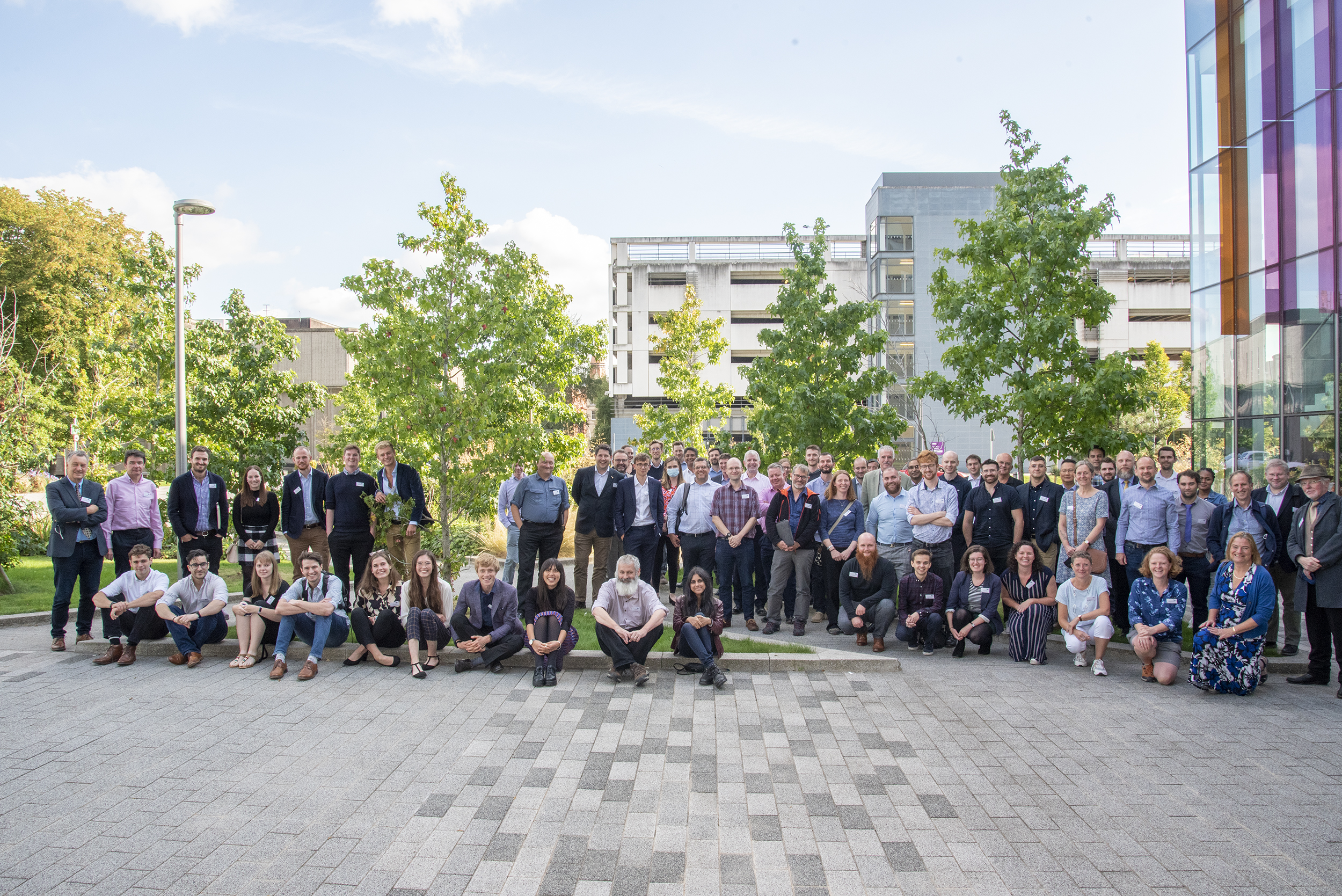
Event summary
The first RWM Research Support Office Annual Conference was held in Manchester 15-16 September 2021. Around 90 people across academia, industry, funders and regulators joined us in person for a fantastic 2-day event. We welcomed delegates from a range of UK universities, RWM and industry. It was the first time many attendees had been able to meet face to face and there was a wonderful atmosphere throughout the event as delegates took full advantage of the opportunity to catch up.
The opening day started with an update from John Corderoy, RWM Technical Director. John gave a fantastic overview of the RWM mission before introducing the GDF programme and how underpinning research is pivotal to the programme’s success. This introductory talk set the context for RSO updates and researcher presentations that followed. The first day also included a presentation from Oliver Hall and Lucia Gray at RWM outlining the Visualisation of System Information (ViSI) system that has been developed to manage a digital safety case for a GDF. Research funded by RWM through the RSO will be used to provide evidence for the claims made within the safety case. A final and particularly stimulating presentation by RWM came from Senior Scientific Advisor, Rob Winsley, who presented an update on the siting process and current progress.
The second day began with a plenary presentation by Sergey Churakov, who joined us from the Paul Scherrer Institute in Switzerland. Sergey presented An Overview of the Paul Scherrer Institute Laboratory for Waste Management Activities in Support of the NAGRA Research and Development Program. It was fantastic to get a Swiss view of geological disposal and some insight into the current research progress at such an established institution.
Ongoing research from across the UK that is relevant to a GDF was presented on each day in a series of technical presentations delivered by PhD students, post-doctoral researchers and research fellows. Technical research was also presented on posters by current PhD students. It was fantastic to see such a range of research on display, reflecting how complex a challenge it will be to deliver a GDF.
A key principle of the RSO is the RWM Subject Matter Experts working closely with academic Discipline Leads across broad themes. Each theme provided an update over the two days of the conference, including highlighting research priorities and upcoming opportunities. Two significant upcoming opportunities are the PhD bursary call and a workshop on the Lower Strength Sedimentary Rock (LSSR) topic area. The PhD call will open in October 2021 and RWM expects to fund 10-15 new PhD projects to start in 2022. Details of all upcoming opportunities will be posted on the RSO website and sent out via our newsletter. Sign up here to ensure you don’t miss out.
Open and transparent discussion was encouraged throughout the conference and time was dedicated to two poster sessions, a communication training exercise, and a dungeons and dragons style game that had been developed to reflect the nuclear industries relationship to national energy demand, the local area and wider industry. In between presentations, the conference venue was never quiet, which was wonderful given the previous 18 months. We look forward to seeing everyone next year!
A feedback survey remained open for a week after the event to gather views on both the conference and the RSO. This feedback will be taken on board to improve future events and how we work. Slides from the conference are available on the website, just scroll down to “Programme agenda and slides”.
Programme Agenda and Slides
Some slides have been omitted to remove unpublished data.
Day 1 – 15 September
09:00 Registration and coffee
10:00 Welcome – Katherine Morris (RWM RSO Director) and Lucy Bailey (Head of the RSO)
10:05 Update on progress of the GDF programme and forward vision – John Corderoy (RWM)
10:25 Highlights from the RSO –Katherine Morris (RWM RSO Director) and Lucy Bailey (Head of the RSO)
10:45 Questions to RSO/RWM panel
11:00 Break
11:15 Discipline updates 1
- Materials Science – Claire Corkhill / Amy Shelton
- Applied Social Science– Adrian Bull / Steve Brown
- Environmental Science – David Copplestone / Kat Raines
- Advanced Manufacturing – Steve Jones / Richard Hardy
12:15 Technical presentations 1 – Chair David Copplestone
- Effects on permeability of rock fracture geometry and fluid/rock temperature contrast – Gonҫalo Cunha (University of Edinburgh)
- The Microbial Impact on Cellulose Hydrolysis in a Cementitious Geological Disposal Facility – Naji Bassil (University of Manchester)
- Radionuclide biogeochemistry during sulfidation – Luke Townsend (University of Sheffield)
13:00 Lunch and poster session
14:30 Funding opportunities – Katherine Morris and Sam Shaw
15:15 Introduction to ViSI system, with hands on demonstrations available over coffee break – Oliver Hall and Lucia Gray (RWM)
15:40 Skills and Outreach in the RSO – Scott Heath (RSO Training lead)
15:45 Coffee – During this break there will be a Bus Stop poster communication exercise for PhD students
16:45 Bus stop posters review and feedback
17:30 Dalton nuclear futures game activity with pre-dinner drinks
19:00 Conference dinner
Day 2 – 16 September
09:00 Welcome – Katherine Morris (RWM RSO Director) and Lucy Bailey (Head of the RSO)
09:05 Fundamental and applied research on geochemistry of nuclear waste disposal in Switzerland – Sergey Churakov (Paul Scherrer Institute)
10:00 Siting a GDF, Rob Winsley (RWM)
10:30 Coffee
10:45 Technical presentations 2 – Chair Becky Lunn
- Potential role of digital twins in a GDF – Kristof Bartha (University of Manchester)
- Corrosion and Leaching of Carbide Fuels – Dimitris Samaras (University of Bristol)
- Development of zirconolite-rich wasteform materials for plutonium disposition – Lewis Blackburn (University of Sheffield)
- Estimating the long term behaviour of vitrified nuclear waste: a natural analogue approach – Clare Thorpe (University of Sheffield)
11:45 Poster session: Overview of national research infrastructure including NNUF, DCF, and NERC facilities
12:30 Lunch
13:30 Discipline updates 2
- Radiochemistry – Francis Livens / Will Bower
- Geotechnical / Engineered barriers – Majid Sedighi / Matthew Kirby
- Applied Mathematics – Robert Zimmerman / Oliver Hall
- Geosciences– Kevin Taylor / Sally Thompson
- Gas – Kath Morris / Simon Norris / Andy Cooke
- Sub-surface Engineering – Becky Lunn / Dan Garbutt
15:00 Closing remarks, Neil Hyatt (University of Sheffield)
15:15 Coffee / close
Gallery
RWM RSO Virtual Launch Meeting
16 – 18 September 2020
In September 2020 we held our Launch event for the Radioactive Waste Management Research Support Office (RWM RSO).
Event summary
The RWM Research Support Office successfully launched online over 16-18 September. Over 130 people across academia, industry, funders and regulators joined us across the lively 3-day event. The majority of attendees were from academia, with over 10 UK universities represented. We also welcomed delegates from NDA, RWM, UKRI and other relevant organisations. It was fantastic to have such a broad community presence and we look forward to building on this solid start over the coming years.
“We were delighted to meet our colleagues, share examples of RWM relevant research from leading researchers, and explain the opportunities the RSO will offer with the PhD Studentship Scheme and the Gas workshops generating lots of interest and engagement. We look forward to the next steps and working with our community to identify, support and deliver new, underpinning and GDF relevant research in the UK.” Katherine Morris, RSO Director.
The opening day introduced the RSO and RWM through presentations from director Katherine Morris, RWM RSO lead Lucy Bailey, and Sheffield RSO lead Neil Hyatt. There was also a presentation on the RWM siting process from Jon Martin and two dynamic Q & A sessions. The feedback and engagement from the community is hugely appreciated and it will be an essential input to shaping our future activities.
The second day began with the launch of the first annual RSO PhD call by Manchester RSO lead, Sam Shaw. This stimulated a lot of useful contributions that will be used to inform and improve the first annual call intended to launch in autumn 2020. The rest of day two included three presentations from leading researchers Ian Farnan, Rebecca Lunn and Tom Scott sharing their technical understanding and, as importantly, how they built their working relationship with RWM. We then finished with an invited plenary from Allan Hedin from SKB who gave a fantastic overview of the history and future of the programme for spent nuclear fuel in Sweden.
The final day of the launch was an experimental online based research proposal development workshop focussing on “Gas generation, migration and reactivity in radioactive waste disposal”. Simon Norris (RWM) provided the technical background for the day. Participants split into four groups, based on the areas of interest that they had declared on registration. These topics were:
- Gas Generation: Inorganic Processes
- Gas Generation: Organic/Bio
- Gas Migration and Reactivity: EBS System
- Gas Migration and Reactivity: Geosphere/Biosphere
Each topic group had both an RSO academic and RWM expert facilitating discussions and completed a standardised form based on their research inputs. These were fruitful discussions providing useful content for RWM with the advice of the RSO to take forwards and develop into a funding call. Coordinating such a workshop over zoom was a novel experience for us. Despite technical worries, everything ran smoothly and the workshop discussions were worthwhile and insightful and feedback was on the whole very positive.
“It was exciting to see (albeit online) so many experts engaging with the RSO and sharing ideas that will help us shape our forthcoming research call. This workshop was the first of its kind and exceeded our expectations in terms of number of participants and level of engagement. A huge thank you to all involved.” Lucy Bailey, Head of Research Support Office, RWM
We have a feedback survey that remained open for a week after the event to gather views on the RSO and the workshop element. This feedback will be taken on board to improve future events and the RSO. Slides from the three days are available on the website, just scroll down to “Programme agenda and slides”.
The RSO represents a significant investment in GDF research in the UK that will create many opportunities over the next five years and is a unique endeavour amongst WMOs in Europe. We look forwards to building on the fantastic amount of community interest we have received so far.
Programme Agenda and Slides
Day 1 – 16 September
09.30 am – Zoom waiting room open prior to conference
10.00 am – Welcome – Professor Katherine Morris (RWM RSO and The University of Manchester) Slides (PDF)
10.15am – RWM aim and mission – Lucy Bailey (RWM) Slides (PDF)
10.40 am – Introduction to the RWM Research Support Office– Prof Neil Hyatt (RWM RSO and University of Sheffield) Slides (PDF)
11.10 am – Questions to RSO/RWM panel (Lucy Bailey, Katherine Morris, Neil Hyatt)
11.40 am – Break
12.00 am – RWM siting process and research programme – Dr Jon Martin (RWM) Slides (PDF)
12.30 pm – Community discussion and feedback
01.00 pm – Close Day 1
Day 2 – 17 September
09.30 am – Zoom waiting room open prior to conference
10.00 am – Launch of RWM RSO 2021 PhD Project Fund – Prof Sam Shaw (The University of Manchester) Slides (PDF)
10.15 am – Questions
10.25 am – Research presentations from current RWM-funded projects:
“The Effect of Compositional Differences on UK Radioactive Glass Durability” – Prof Ian Farnan (University of Cambridge) Slides (PDF)
“Organic Fingerprinting of Groundwater to Determine Surface Water Origins” – Prof Rebecca Lunn (University of Strathclyde) Slides (PDF)
“In-situ analysis techniques to understand the behaviour of waste and backfill materials in a GDF environment” – Prof Tom Scott (University of Bristol) Slides (PDF)
11.25 am – Panel questions and discussion
11.35 am – Break
11.45 am – Plenary:
“Interplay between research and safety assessment in the Swedish programme for spent nuclear fuel” – Dr Allan Hedin (Manager of Safety Assessments at SKB, Sweden) Slides (PDF)
12:30 pm – Questions and discussion
12:45 pm – Close Day 2
Day 3 – 18 September – Research Topic meetings
Research proposal development workshop: “Gas Generation, Migration and Reactivity in Radioactive Waste Disposal”
The day will include breakout sessions of smaller groups to develop particular research topics and proposal strategies along the following 4 themes:
- Gas Generation: Inorganic Processes
- Gas Generation: Organic/Bio
- Gas Migration and Reactivity: EBS System
- Gas Migration and Reactivity: Geosphere/Biosphere
09.20 am – Zoom waiting room open prior to conference
09.30 am – Opening remarks – Professor Katherine Morris (RWM RSO and The University of Manchester) & Lucy Bailey (RWM)
09.35 am – Plenary: Technical Introduction to Workshop Sessions – Dr Simon Norris (RWM) Slides (PDF)
09.55 am – Plenary: Workshop plans and outputs – Professor Katherine Morris (RWM RSO and The University of Manchester)
10.00 am – Breakout Session A – join first breakout group
10.05 am – Workshop Session A
11.20 am – Break
11.30 am – Join second breakout group
11.30 am – Breakout Session B
12.40 pm – Break
01.00 pm – Plenary: Way forward and next steps – Dr Simon Norris (RWM)
01.10 pm – Plenary: Reflection and closing remarks – Lucy Bailey (RWM) Slides (PDF)
01.20 pm – Close Day 3
Organising members
Professor Katherine Morris – Director of RSO and Chair (The University of Manchester)
Professor Sam Shaw – RSO academic Lead (The University of Manchester)
Professor Neil Hyatt – RSO academic lead (University of Sheffield)
Lucy Bailey – RWM RSO lead
Sabina Hawthornthwaite – RSO Project Manager
Key dates
4 August – Registration opens
15 August – Registration for conference and proposal development workshop deadline
30 August – Late registration deadline
16 – 18 September – Event
Contact us
We welcome opportunities to connect with the research community, industry and the general public.

